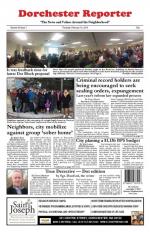September 27, 2012
The Dorchester Community Food Co-op is having a good year. After launching several projects to provide healthy and affordable food to the Bowdoin-Geneva neighborhood, the organization has also received a $10,000 grant from the Food Co-op Initiative to build a community store.
“The grant we received recently is a $10,000 grant to build a worker- and member-owned food co-op,” said Joel Wool, an environmental organizer who’s on the steering committee of the DCFC. “Community members and workers will have a vote in deciding the development of the store and which foods are stocked. They will have a voice in how the shop is run. They will have the power.”
Wool, who is also a volunteer with DCFC sponsor GreenDorchester, credits founder Jenny Silverman for coming up with the idea. Silverman, however, won’t accept all the credit.
“I wouldn’t call myself the founder,” said the Codman Square resident. “I’m the project manager of the co-op. Even though I had the first idea, it’s a community project.”
Silverman explained that this food co-op, which aims to be up and running in the Bowdoin-Geneva area come fall 2014, will have many benefits.
“We want to build a beautiful store that would serve our entire community, with good foods and good jobs for the community,” said the 62-year-old. “We want to build a place that people can come to get healthy food. We’ll have unprocessed food and organic food and fresh food. They’ll be cooking classes, nutrition education, health foods that aren’t available in other stores, training opportunities. People will learn things about growing their own food, how to stretch their dollars. They’ll be a lot of food-related and community-related goals. It’ll be an economic engine for community.”
Wool agrees that this co-op will help the local economy: “We would be physically hiring local people and helping to develop the local economy. This community organization is different from a local grocery store because it would not only be offering a different set of products, but it will be built with the community in mind. In a normal grocery store you won’t be able to buy things in bulk like lentils or beans. When you do that kind of bulk purchasing, you can provide it to the community at an affordable price.”
Wool thinks this is an important and growing movement. Concerned with the widespread problems of diabetes and obesity and the lack of affordable and healthy food in the community, the Fields Corner resident has spent the last year working to address these issues.
“The co-op has social, economic and health factors,” he said. “ I really believe people should engage in their own community and address problems. But people are often denied opportunities because they lack the information or the resources. People know there are health problems in the neighborhood. People know the food is not healthy, but they can’t act on them. If we work across racial and linguistic and class boundaries, we can permanently help the community grow strong. I would like to see growth that is truly multiethnic. In Dorchester, there is incredible devotion to the community and to one another. It’s got to come from within. The cooperative movement is growing in Dorchester, and it will continue to grow. It’s the year of the co-op.”
For the past year, the 24-year-old has been helping to make affordable and healthy foods a reality for local people.
“People are unhealthy and they can’t afford healthy foods,” said Wool. “I think we’ve shown that people in the neighborhood want healthy food and will buy it if they can afford it.”
In January, the DCFC held a winter farmers market in Codman Square. Of the event, Wool said it was “a huge success,” explaining “hundreds and hundreds came,” and that they are the only co-op to accept food stamps. Then this summer the DCFC, in partnership with the Sustainability Guild, hosted the Fresh Fridays café series in First Parish Church. The DCFC plans to keep both projects running, according to Wool.
“While these projects have gotten a really positive response from the community, they’re not the end mission,” he said. “We need to have a brick and mortar store to have a home for these social missions we build for the neighborhood. The goal needs to be constantly engaging the community and welcoming it in. Many people in Dorchester just want places to hang out. The co-op needs to be a place that’s inviting enough to do that. I think it will be a smart use of space.”



